Theories and Tools in Critical Thinking for Decision Making
VerifiedAdded on 2023/06/04
|10
|3152
|134
Essay
AI Summary
This essay delves into the theories and tools essential for critical thinking in managerial decision-making. It examines utility theory, highlighting its role in understanding individual preferences and consumer demand. The importance of self-awareness is discussed, emphasizing how understanding one's feelings and beliefs impacts decision-making. The essay also explores the concepts of slow and fast thinking, logical reasoning, prospect theory, and emotional intelligence, illustrating their influence on choices and judgments. Each theory is analyzed for its significance in managerial contexts and its potential impact on personal and professional life, providing a comprehensive overview of how critical thinking frameworks can enhance decision-making processes.
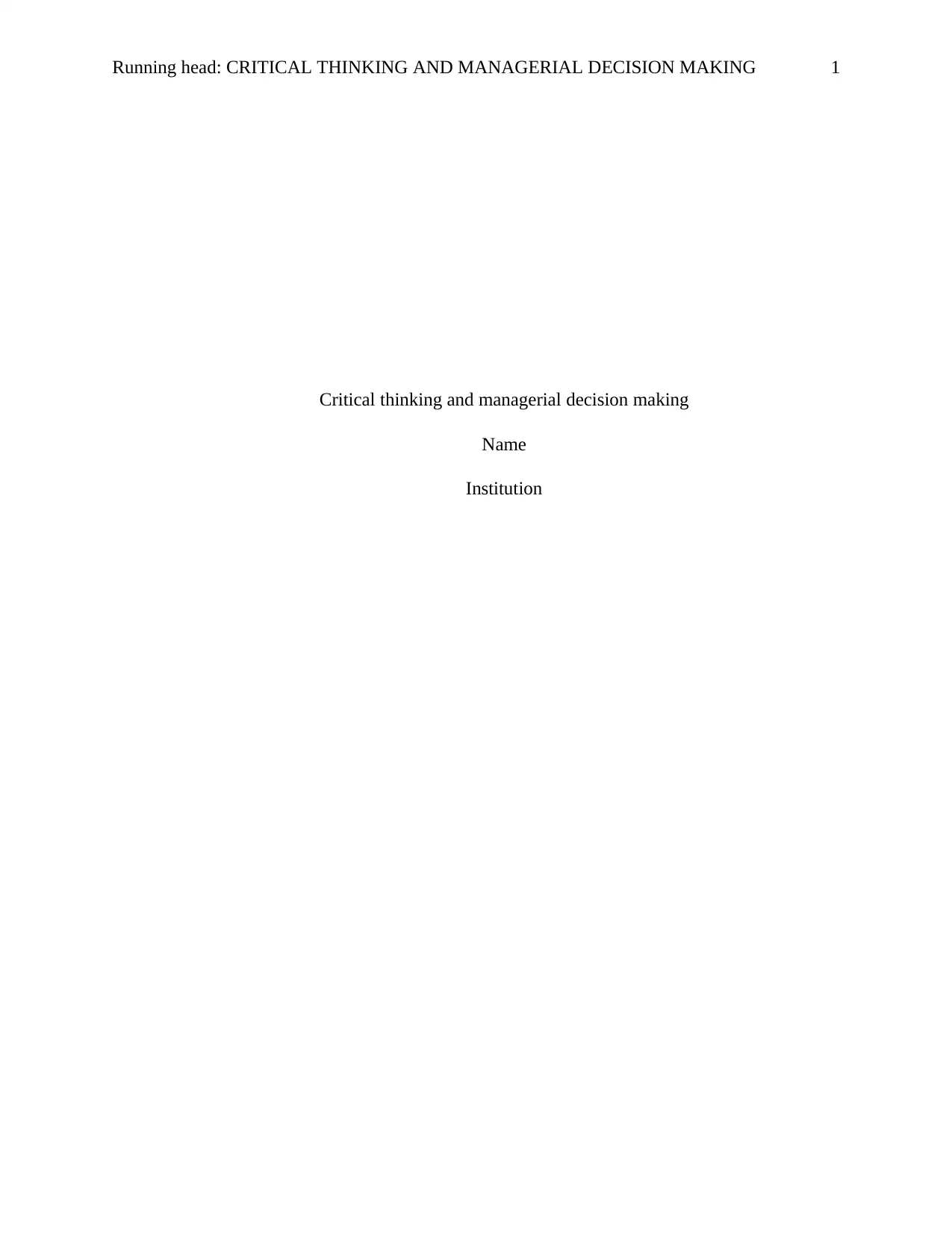
Running head: CRITICAL THINKING AND MANAGERIAL DECISION MAKING 1
Critical thinking and managerial decision making
Name
Institution
Critical thinking and managerial decision making
Name
Institution
Paraphrase This Document
Need a fresh take? Get an instant paraphrase of this document with our AI Paraphraser
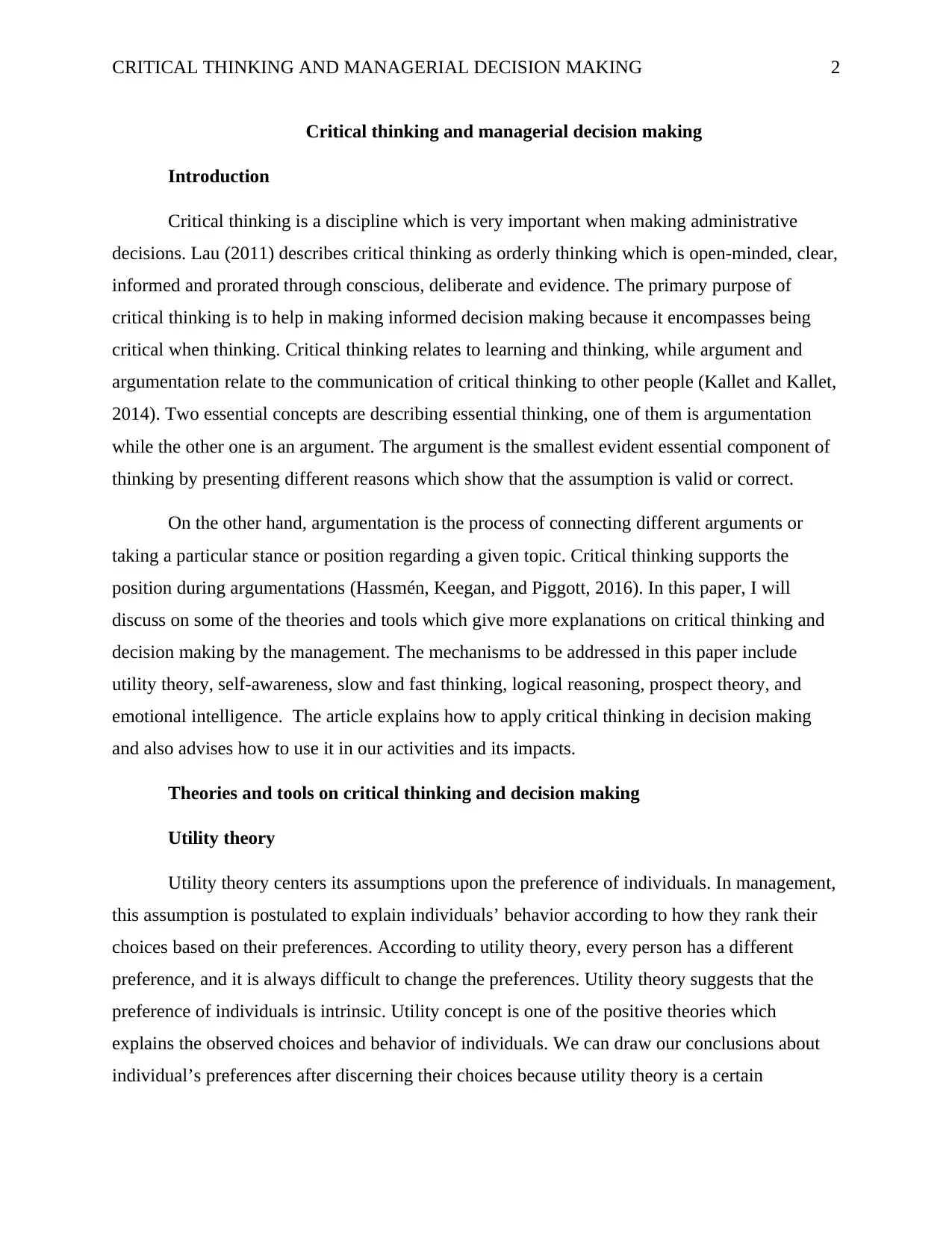
CRITICAL THINKING AND MANAGERIAL DECISION MAKING 2
Critical thinking and managerial decision making
Introduction
Critical thinking is a discipline which is very important when making administrative
decisions. Lau (2011) describes critical thinking as orderly thinking which is open-minded, clear,
informed and prorated through conscious, deliberate and evidence. The primary purpose of
critical thinking is to help in making informed decision making because it encompasses being
critical when thinking. Critical thinking relates to learning and thinking, while argument and
argumentation relate to the communication of critical thinking to other people (Kallet and Kallet,
2014). Two essential concepts are describing essential thinking, one of them is argumentation
while the other one is an argument. The argument is the smallest evident essential component of
thinking by presenting different reasons which show that the assumption is valid or correct.
On the other hand, argumentation is the process of connecting different arguments or
taking a particular stance or position regarding a given topic. Critical thinking supports the
position during argumentations (Hassmén, Keegan, and Piggott, 2016). In this paper, I will
discuss on some of the theories and tools which give more explanations on critical thinking and
decision making by the management. The mechanisms to be addressed in this paper include
utility theory, self-awareness, slow and fast thinking, logical reasoning, prospect theory, and
emotional intelligence. The article explains how to apply critical thinking in decision making
and also advises how to use it in our activities and its impacts.
Theories and tools on critical thinking and decision making
Utility theory
Utility theory centers its assumptions upon the preference of individuals. In management,
this assumption is postulated to explain individuals’ behavior according to how they rank their
choices based on their preferences. According to utility theory, every person has a different
preference, and it is always difficult to change the preferences. Utility theory suggests that the
preference of individuals is intrinsic. Utility concept is one of the positive theories which
explains the observed choices and behavior of individuals. We can draw our conclusions about
individual’s preferences after discerning their choices because utility theory is a certain
Critical thinking and managerial decision making
Introduction
Critical thinking is a discipline which is very important when making administrative
decisions. Lau (2011) describes critical thinking as orderly thinking which is open-minded, clear,
informed and prorated through conscious, deliberate and evidence. The primary purpose of
critical thinking is to help in making informed decision making because it encompasses being
critical when thinking. Critical thinking relates to learning and thinking, while argument and
argumentation relate to the communication of critical thinking to other people (Kallet and Kallet,
2014). Two essential concepts are describing essential thinking, one of them is argumentation
while the other one is an argument. The argument is the smallest evident essential component of
thinking by presenting different reasons which show that the assumption is valid or correct.
On the other hand, argumentation is the process of connecting different arguments or
taking a particular stance or position regarding a given topic. Critical thinking supports the
position during argumentations (Hassmén, Keegan, and Piggott, 2016). In this paper, I will
discuss on some of the theories and tools which give more explanations on critical thinking and
decision making by the management. The mechanisms to be addressed in this paper include
utility theory, self-awareness, slow and fast thinking, logical reasoning, prospect theory, and
emotional intelligence. The article explains how to apply critical thinking in decision making
and also advises how to use it in our activities and its impacts.
Theories and tools on critical thinking and decision making
Utility theory
Utility theory centers its assumptions upon the preference of individuals. In management,
this assumption is postulated to explain individuals’ behavior according to how they rank their
choices based on their preferences. According to utility theory, every person has a different
preference, and it is always difficult to change the preferences. Utility theory suggests that the
preference of individuals is intrinsic. Utility concept is one of the positive theories which
explains the observed choices and behavior of individuals. We can draw our conclusions about
individual’s preferences after discerning their choices because utility theory is a certain
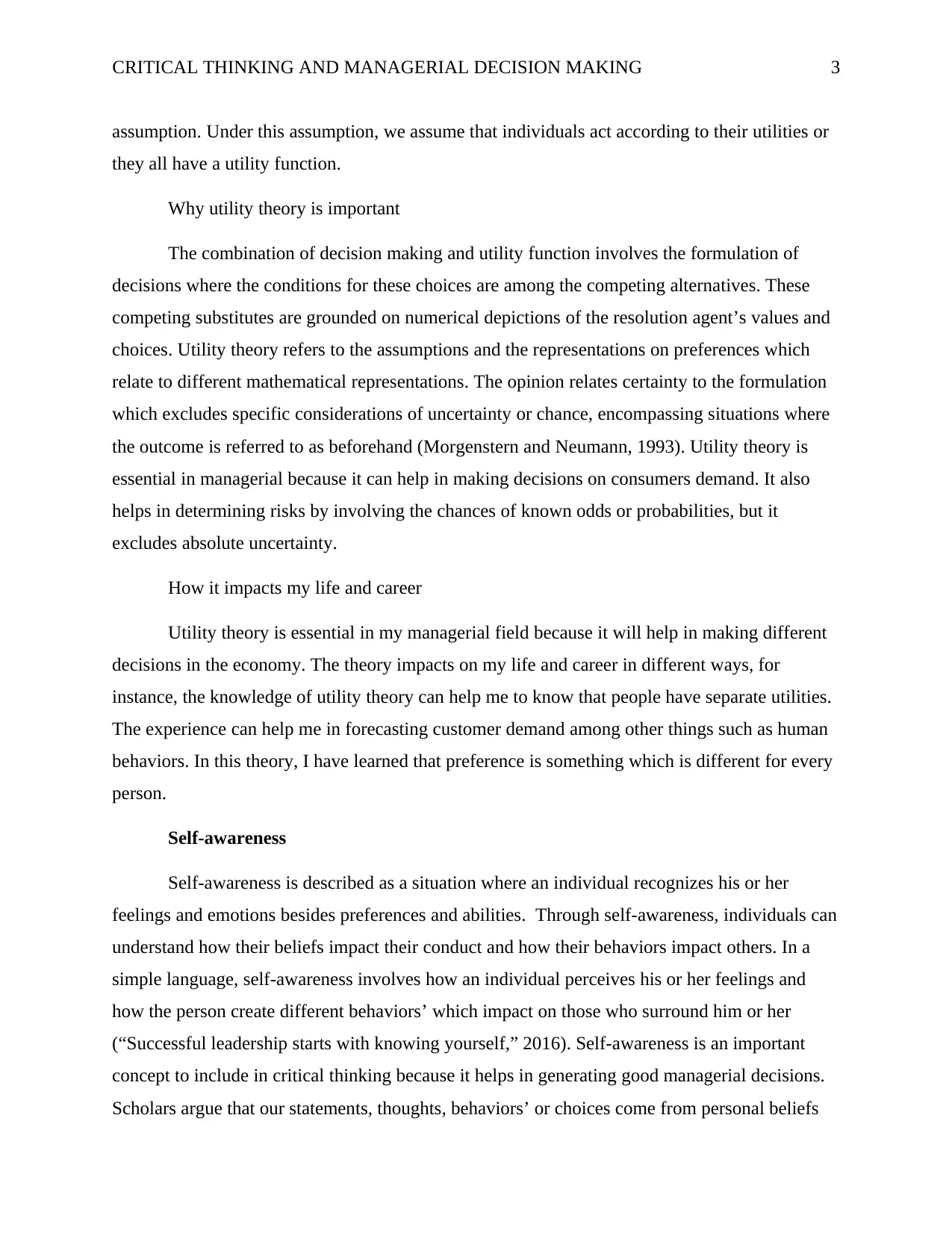
CRITICAL THINKING AND MANAGERIAL DECISION MAKING 3
assumption. Under this assumption, we assume that individuals act according to their utilities or
they all have a utility function.
Why utility theory is important
The combination of decision making and utility function involves the formulation of
decisions where the conditions for these choices are among the competing alternatives. These
competing substitutes are grounded on numerical depictions of the resolution agent’s values and
choices. Utility theory refers to the assumptions and the representations on preferences which
relate to different mathematical representations. The opinion relates certainty to the formulation
which excludes specific considerations of uncertainty or chance, encompassing situations where
the outcome is referred to as beforehand (Morgenstern and Neumann, 1993). Utility theory is
essential in managerial because it can help in making decisions on consumers demand. It also
helps in determining risks by involving the chances of known odds or probabilities, but it
excludes absolute uncertainty.
How it impacts my life and career
Utility theory is essential in my managerial field because it will help in making different
decisions in the economy. The theory impacts on my life and career in different ways, for
instance, the knowledge of utility theory can help me to know that people have separate utilities.
The experience can help me in forecasting customer demand among other things such as human
behaviors. In this theory, I have learned that preference is something which is different for every
person.
Self-awareness
Self-awareness is described as a situation where an individual recognizes his or her
feelings and emotions besides preferences and abilities. Through self-awareness, individuals can
understand how their beliefs impact their conduct and how their behaviors impact others. In a
simple language, self-awareness involves how an individual perceives his or her feelings and
how the person create different behaviors’ which impact on those who surround him or her
(“Successful leadership starts with knowing yourself,” 2016). Self-awareness is an important
concept to include in critical thinking because it helps in generating good managerial decisions.
Scholars argue that our statements, thoughts, behaviors’ or choices come from personal beliefs
assumption. Under this assumption, we assume that individuals act according to their utilities or
they all have a utility function.
Why utility theory is important
The combination of decision making and utility function involves the formulation of
decisions where the conditions for these choices are among the competing alternatives. These
competing substitutes are grounded on numerical depictions of the resolution agent’s values and
choices. Utility theory refers to the assumptions and the representations on preferences which
relate to different mathematical representations. The opinion relates certainty to the formulation
which excludes specific considerations of uncertainty or chance, encompassing situations where
the outcome is referred to as beforehand (Morgenstern and Neumann, 1993). Utility theory is
essential in managerial because it can help in making decisions on consumers demand. It also
helps in determining risks by involving the chances of known odds or probabilities, but it
excludes absolute uncertainty.
How it impacts my life and career
Utility theory is essential in my managerial field because it will help in making different
decisions in the economy. The theory impacts on my life and career in different ways, for
instance, the knowledge of utility theory can help me to know that people have separate utilities.
The experience can help me in forecasting customer demand among other things such as human
behaviors. In this theory, I have learned that preference is something which is different for every
person.
Self-awareness
Self-awareness is described as a situation where an individual recognizes his or her
feelings and emotions besides preferences and abilities. Through self-awareness, individuals can
understand how their beliefs impact their conduct and how their behaviors impact others. In a
simple language, self-awareness involves how an individual perceives his or her feelings and
how the person create different behaviors’ which impact on those who surround him or her
(“Successful leadership starts with knowing yourself,” 2016). Self-awareness is an important
concept to include in critical thinking because it helps in generating good managerial decisions.
Scholars argue that our statements, thoughts, behaviors’ or choices come from personal beliefs
⊘ This is a preview!⊘
Do you want full access?
Subscribe today to unlock all pages.

Trusted by 1+ million students worldwide
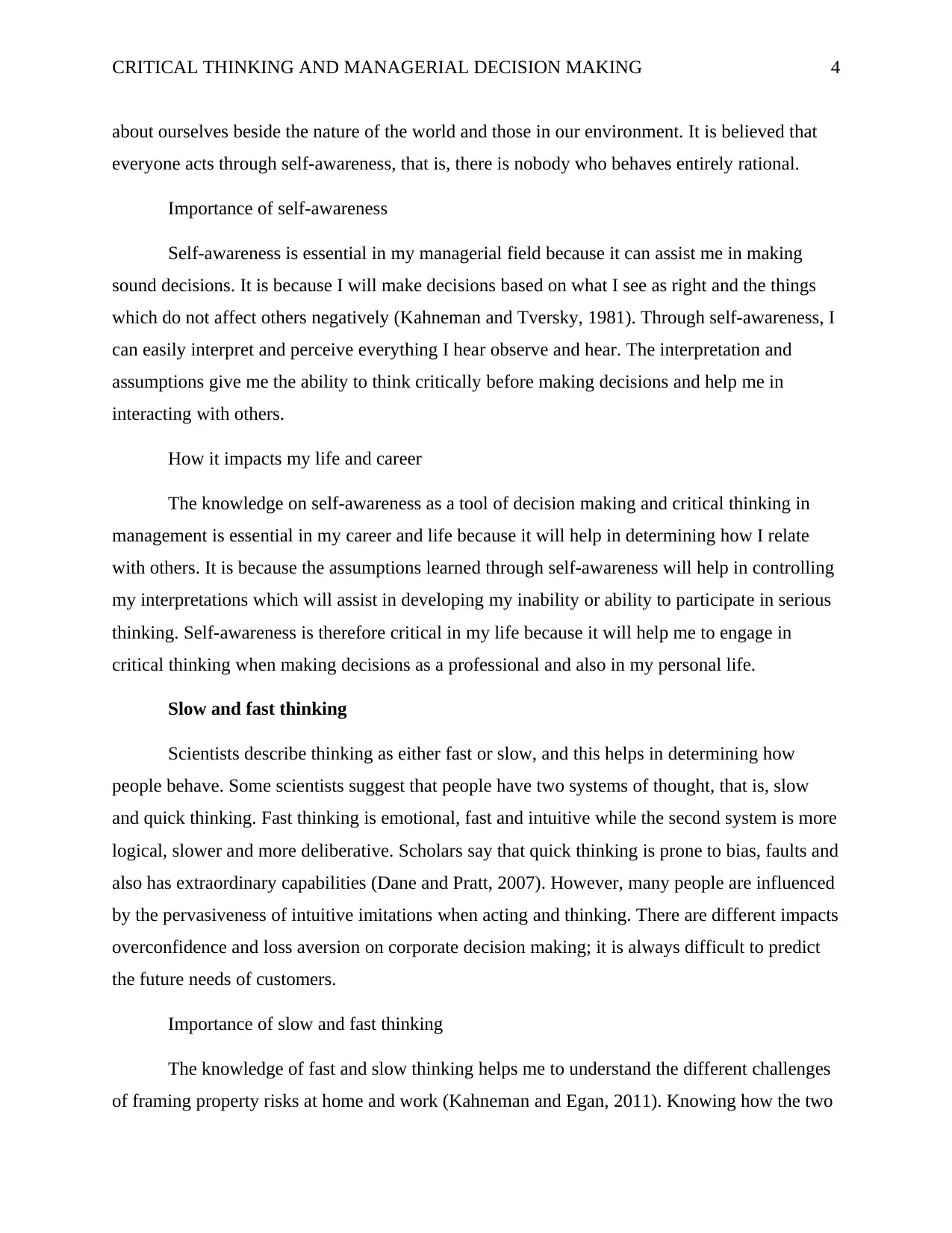
CRITICAL THINKING AND MANAGERIAL DECISION MAKING 4
about ourselves beside the nature of the world and those in our environment. It is believed that
everyone acts through self-awareness, that is, there is nobody who behaves entirely rational.
Importance of self-awareness
Self-awareness is essential in my managerial field because it can assist me in making
sound decisions. It is because I will make decisions based on what I see as right and the things
which do not affect others negatively (Kahneman and Tversky, 1981). Through self-awareness, I
can easily interpret and perceive everything I hear observe and hear. The interpretation and
assumptions give me the ability to think critically before making decisions and help me in
interacting with others.
How it impacts my life and career
The knowledge on self-awareness as a tool of decision making and critical thinking in
management is essential in my career and life because it will help in determining how I relate
with others. It is because the assumptions learned through self-awareness will help in controlling
my interpretations which will assist in developing my inability or ability to participate in serious
thinking. Self-awareness is therefore critical in my life because it will help me to engage in
critical thinking when making decisions as a professional and also in my personal life.
Slow and fast thinking
Scientists describe thinking as either fast or slow, and this helps in determining how
people behave. Some scientists suggest that people have two systems of thought, that is, slow
and quick thinking. Fast thinking is emotional, fast and intuitive while the second system is more
logical, slower and more deliberative. Scholars say that quick thinking is prone to bias, faults and
also has extraordinary capabilities (Dane and Pratt, 2007). However, many people are influenced
by the pervasiveness of intuitive imitations when acting and thinking. There are different impacts
overconfidence and loss aversion on corporate decision making; it is always difficult to predict
the future needs of customers.
Importance of slow and fast thinking
The knowledge of fast and slow thinking helps me to understand the different challenges
of framing property risks at home and work (Kahneman and Egan, 2011). Knowing how the two
about ourselves beside the nature of the world and those in our environment. It is believed that
everyone acts through self-awareness, that is, there is nobody who behaves entirely rational.
Importance of self-awareness
Self-awareness is essential in my managerial field because it can assist me in making
sound decisions. It is because I will make decisions based on what I see as right and the things
which do not affect others negatively (Kahneman and Tversky, 1981). Through self-awareness, I
can easily interpret and perceive everything I hear observe and hear. The interpretation and
assumptions give me the ability to think critically before making decisions and help me in
interacting with others.
How it impacts my life and career
The knowledge on self-awareness as a tool of decision making and critical thinking in
management is essential in my career and life because it will help in determining how I relate
with others. It is because the assumptions learned through self-awareness will help in controlling
my interpretations which will assist in developing my inability or ability to participate in serious
thinking. Self-awareness is therefore critical in my life because it will help me to engage in
critical thinking when making decisions as a professional and also in my personal life.
Slow and fast thinking
Scientists describe thinking as either fast or slow, and this helps in determining how
people behave. Some scientists suggest that people have two systems of thought, that is, slow
and quick thinking. Fast thinking is emotional, fast and intuitive while the second system is more
logical, slower and more deliberative. Scholars say that quick thinking is prone to bias, faults and
also has extraordinary capabilities (Dane and Pratt, 2007). However, many people are influenced
by the pervasiveness of intuitive imitations when acting and thinking. There are different impacts
overconfidence and loss aversion on corporate decision making; it is always difficult to predict
the future needs of customers.
Importance of slow and fast thinking
The knowledge of fast and slow thinking helps me to understand the different challenges
of framing property risks at home and work (Kahneman and Egan, 2011). Knowing how the two
Paraphrase This Document
Need a fresh take? Get an instant paraphrase of this document with our AI Paraphraser
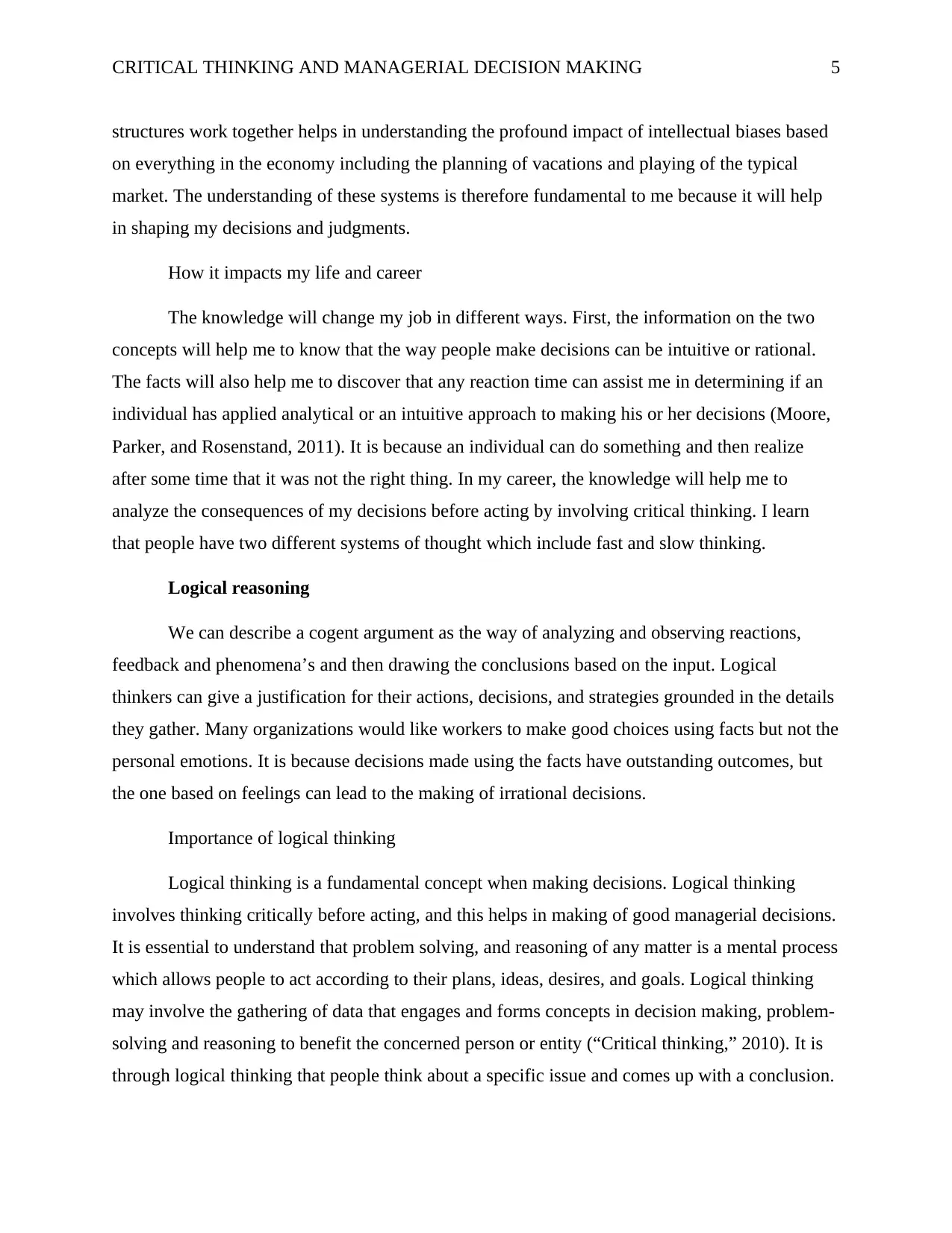
CRITICAL THINKING AND MANAGERIAL DECISION MAKING 5
structures work together helps in understanding the profound impact of intellectual biases based
on everything in the economy including the planning of vacations and playing of the typical
market. The understanding of these systems is therefore fundamental to me because it will help
in shaping my decisions and judgments.
How it impacts my life and career
The knowledge will change my job in different ways. First, the information on the two
concepts will help me to know that the way people make decisions can be intuitive or rational.
The facts will also help me to discover that any reaction time can assist me in determining if an
individual has applied analytical or an intuitive approach to making his or her decisions (Moore,
Parker, and Rosenstand, 2011). It is because an individual can do something and then realize
after some time that it was not the right thing. In my career, the knowledge will help me to
analyze the consequences of my decisions before acting by involving critical thinking. I learn
that people have two different systems of thought which include fast and slow thinking.
Logical reasoning
We can describe a cogent argument as the way of analyzing and observing reactions,
feedback and phenomena’s and then drawing the conclusions based on the input. Logical
thinkers can give a justification for their actions, decisions, and strategies grounded in the details
they gather. Many organizations would like workers to make good choices using facts but not the
personal emotions. It is because decisions made using the facts have outstanding outcomes, but
the one based on feelings can lead to the making of irrational decisions.
Importance of logical thinking
Logical thinking is a fundamental concept when making decisions. Logical thinking
involves thinking critically before acting, and this helps in making of good managerial decisions.
It is essential to understand that problem solving, and reasoning of any matter is a mental process
which allows people to act according to their plans, ideas, desires, and goals. Logical thinking
may involve the gathering of data that engages and forms concepts in decision making, problem-
solving and reasoning to benefit the concerned person or entity (“Critical thinking,” 2010). It is
through logical thinking that people think about a specific issue and comes up with a conclusion.
structures work together helps in understanding the profound impact of intellectual biases based
on everything in the economy including the planning of vacations and playing of the typical
market. The understanding of these systems is therefore fundamental to me because it will help
in shaping my decisions and judgments.
How it impacts my life and career
The knowledge will change my job in different ways. First, the information on the two
concepts will help me to know that the way people make decisions can be intuitive or rational.
The facts will also help me to discover that any reaction time can assist me in determining if an
individual has applied analytical or an intuitive approach to making his or her decisions (Moore,
Parker, and Rosenstand, 2011). It is because an individual can do something and then realize
after some time that it was not the right thing. In my career, the knowledge will help me to
analyze the consequences of my decisions before acting by involving critical thinking. I learn
that people have two different systems of thought which include fast and slow thinking.
Logical reasoning
We can describe a cogent argument as the way of analyzing and observing reactions,
feedback and phenomena’s and then drawing the conclusions based on the input. Logical
thinkers can give a justification for their actions, decisions, and strategies grounded in the details
they gather. Many organizations would like workers to make good choices using facts but not the
personal emotions. It is because decisions made using the facts have outstanding outcomes, but
the one based on feelings can lead to the making of irrational decisions.
Importance of logical thinking
Logical thinking is a fundamental concept when making decisions. Logical thinking
involves thinking critically before acting, and this helps in making of good managerial decisions.
It is essential to understand that problem solving, and reasoning of any matter is a mental process
which allows people to act according to their plans, ideas, desires, and goals. Logical thinking
may involve the gathering of data that engages and forms concepts in decision making, problem-
solving and reasoning to benefit the concerned person or entity (“Critical thinking,” 2010). It is
through logical thinking that people think about a specific issue and comes up with a conclusion.
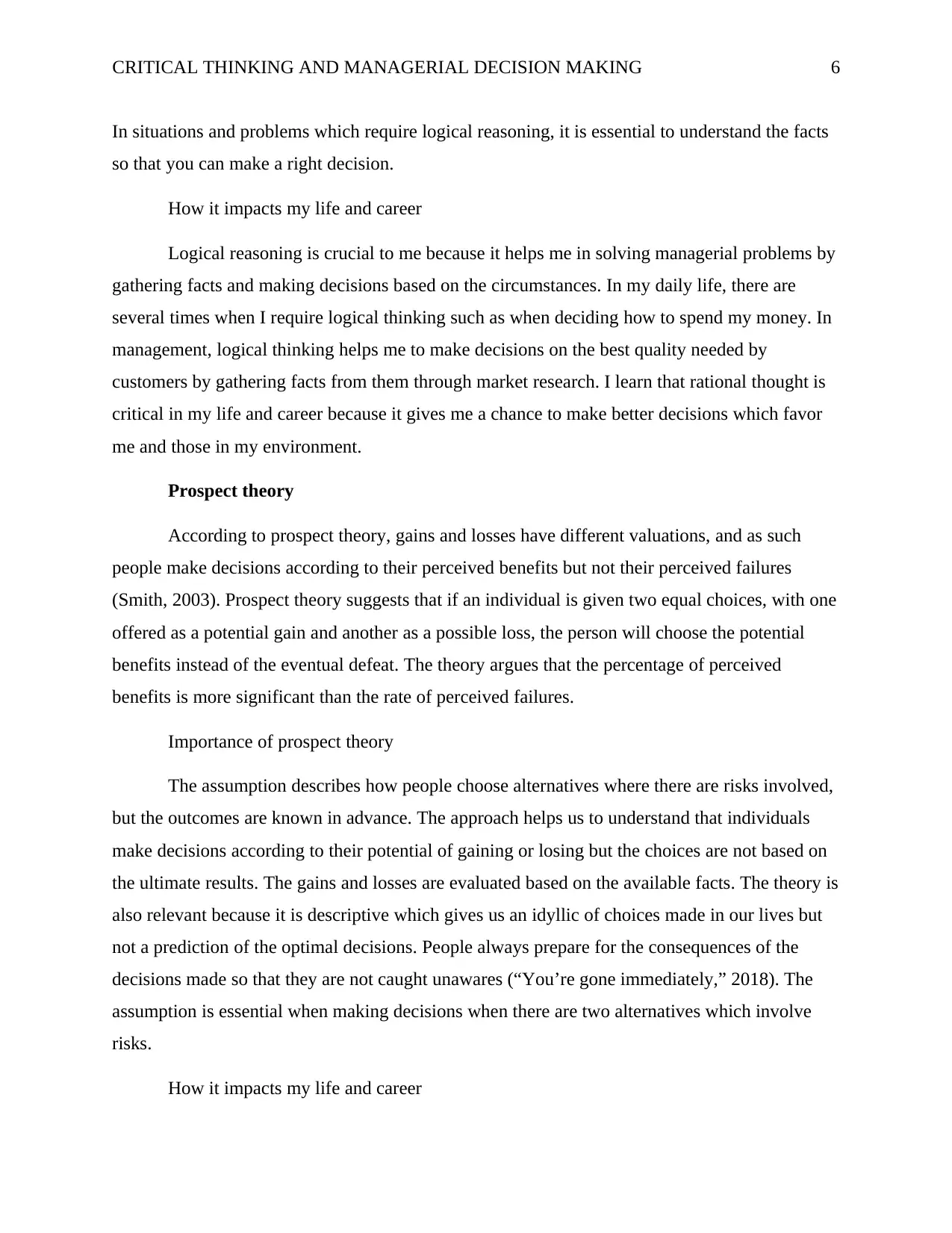
CRITICAL THINKING AND MANAGERIAL DECISION MAKING 6
In situations and problems which require logical reasoning, it is essential to understand the facts
so that you can make a right decision.
How it impacts my life and career
Logical reasoning is crucial to me because it helps me in solving managerial problems by
gathering facts and making decisions based on the circumstances. In my daily life, there are
several times when I require logical thinking such as when deciding how to spend my money. In
management, logical thinking helps me to make decisions on the best quality needed by
customers by gathering facts from them through market research. I learn that rational thought is
critical in my life and career because it gives me a chance to make better decisions which favor
me and those in my environment.
Prospect theory
According to prospect theory, gains and losses have different valuations, and as such
people make decisions according to their perceived benefits but not their perceived failures
(Smith, 2003). Prospect theory suggests that if an individual is given two equal choices, with one
offered as a potential gain and another as a possible loss, the person will choose the potential
benefits instead of the eventual defeat. The theory argues that the percentage of perceived
benefits is more significant than the rate of perceived failures.
Importance of prospect theory
The assumption describes how people choose alternatives where there are risks involved,
but the outcomes are known in advance. The approach helps us to understand that individuals
make decisions according to their potential of gaining or losing but the choices are not based on
the ultimate results. The gains and losses are evaluated based on the available facts. The theory is
also relevant because it is descriptive which gives us an idyllic of choices made in our lives but
not a prediction of the optimal decisions. People always prepare for the consequences of the
decisions made so that they are not caught unawares (“You’re gone immediately,” 2018). The
assumption is essential when making decisions when there are two alternatives which involve
risks.
How it impacts my life and career
In situations and problems which require logical reasoning, it is essential to understand the facts
so that you can make a right decision.
How it impacts my life and career
Logical reasoning is crucial to me because it helps me in solving managerial problems by
gathering facts and making decisions based on the circumstances. In my daily life, there are
several times when I require logical thinking such as when deciding how to spend my money. In
management, logical thinking helps me to make decisions on the best quality needed by
customers by gathering facts from them through market research. I learn that rational thought is
critical in my life and career because it gives me a chance to make better decisions which favor
me and those in my environment.
Prospect theory
According to prospect theory, gains and losses have different valuations, and as such
people make decisions according to their perceived benefits but not their perceived failures
(Smith, 2003). Prospect theory suggests that if an individual is given two equal choices, with one
offered as a potential gain and another as a possible loss, the person will choose the potential
benefits instead of the eventual defeat. The theory argues that the percentage of perceived
benefits is more significant than the rate of perceived failures.
Importance of prospect theory
The assumption describes how people choose alternatives where there are risks involved,
but the outcomes are known in advance. The approach helps us to understand that individuals
make decisions according to their potential of gaining or losing but the choices are not based on
the ultimate results. The gains and losses are evaluated based on the available facts. The theory is
also relevant because it is descriptive which gives us an idyllic of choices made in our lives but
not a prediction of the optimal decisions. People always prepare for the consequences of the
decisions made so that they are not caught unawares (“You’re gone immediately,” 2018). The
assumption is essential when making decisions when there are two alternatives which involve
risks.
How it impacts my life and career
⊘ This is a preview!⊘
Do you want full access?
Subscribe today to unlock all pages.

Trusted by 1+ million students worldwide
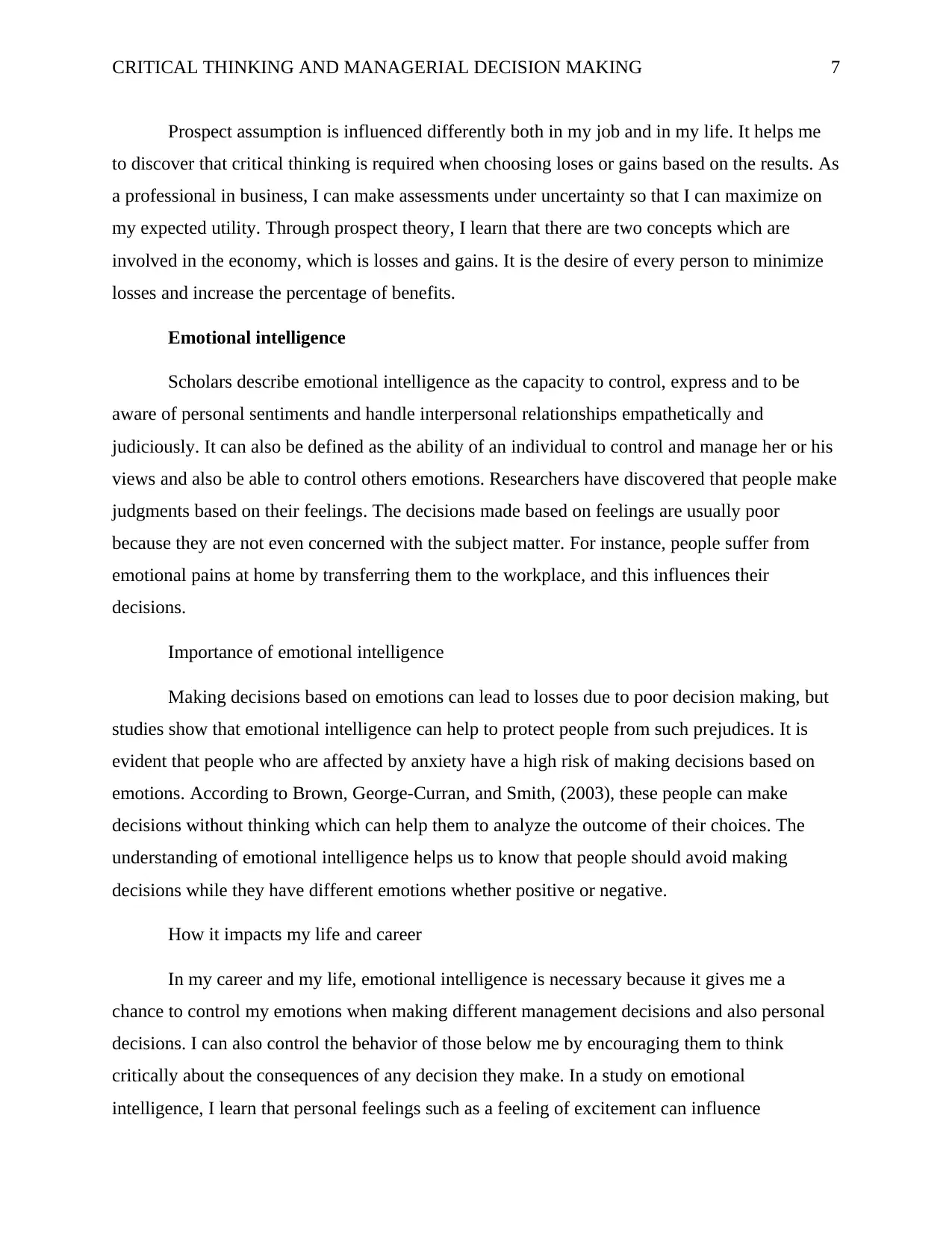
CRITICAL THINKING AND MANAGERIAL DECISION MAKING 7
Prospect assumption is influenced differently both in my job and in my life. It helps me
to discover that critical thinking is required when choosing loses or gains based on the results. As
a professional in business, I can make assessments under uncertainty so that I can maximize on
my expected utility. Through prospect theory, I learn that there are two concepts which are
involved in the economy, which is losses and gains. It is the desire of every person to minimize
losses and increase the percentage of benefits.
Emotional intelligence
Scholars describe emotional intelligence as the capacity to control, express and to be
aware of personal sentiments and handle interpersonal relationships empathetically and
judiciously. It can also be defined as the ability of an individual to control and manage her or his
views and also be able to control others emotions. Researchers have discovered that people make
judgments based on their feelings. The decisions made based on feelings are usually poor
because they are not even concerned with the subject matter. For instance, people suffer from
emotional pains at home by transferring them to the workplace, and this influences their
decisions.
Importance of emotional intelligence
Making decisions based on emotions can lead to losses due to poor decision making, but
studies show that emotional intelligence can help to protect people from such prejudices. It is
evident that people who are affected by anxiety have a high risk of making decisions based on
emotions. According to Brown, George-Curran, and Smith, (2003), these people can make
decisions without thinking which can help them to analyze the outcome of their choices. The
understanding of emotional intelligence helps us to know that people should avoid making
decisions while they have different emotions whether positive or negative.
How it impacts my life and career
In my career and my life, emotional intelligence is necessary because it gives me a
chance to control my emotions when making different management decisions and also personal
decisions. I can also control the behavior of those below me by encouraging them to think
critically about the consequences of any decision they make. In a study on emotional
intelligence, I learn that personal feelings such as a feeling of excitement can influence
Prospect assumption is influenced differently both in my job and in my life. It helps me
to discover that critical thinking is required when choosing loses or gains based on the results. As
a professional in business, I can make assessments under uncertainty so that I can maximize on
my expected utility. Through prospect theory, I learn that there are two concepts which are
involved in the economy, which is losses and gains. It is the desire of every person to minimize
losses and increase the percentage of benefits.
Emotional intelligence
Scholars describe emotional intelligence as the capacity to control, express and to be
aware of personal sentiments and handle interpersonal relationships empathetically and
judiciously. It can also be defined as the ability of an individual to control and manage her or his
views and also be able to control others emotions. Researchers have discovered that people make
judgments based on their feelings. The decisions made based on feelings are usually poor
because they are not even concerned with the subject matter. For instance, people suffer from
emotional pains at home by transferring them to the workplace, and this influences their
decisions.
Importance of emotional intelligence
Making decisions based on emotions can lead to losses due to poor decision making, but
studies show that emotional intelligence can help to protect people from such prejudices. It is
evident that people who are affected by anxiety have a high risk of making decisions based on
emotions. According to Brown, George-Curran, and Smith, (2003), these people can make
decisions without thinking which can help them to analyze the outcome of their choices. The
understanding of emotional intelligence helps us to know that people should avoid making
decisions while they have different emotions whether positive or negative.
How it impacts my life and career
In my career and my life, emotional intelligence is necessary because it gives me a
chance to control my emotions when making different management decisions and also personal
decisions. I can also control the behavior of those below me by encouraging them to think
critically about the consequences of any decision they make. In a study on emotional
intelligence, I learn that personal feelings such as a feeling of excitement can influence
Paraphrase This Document
Need a fresh take? Get an instant paraphrase of this document with our AI Paraphraser
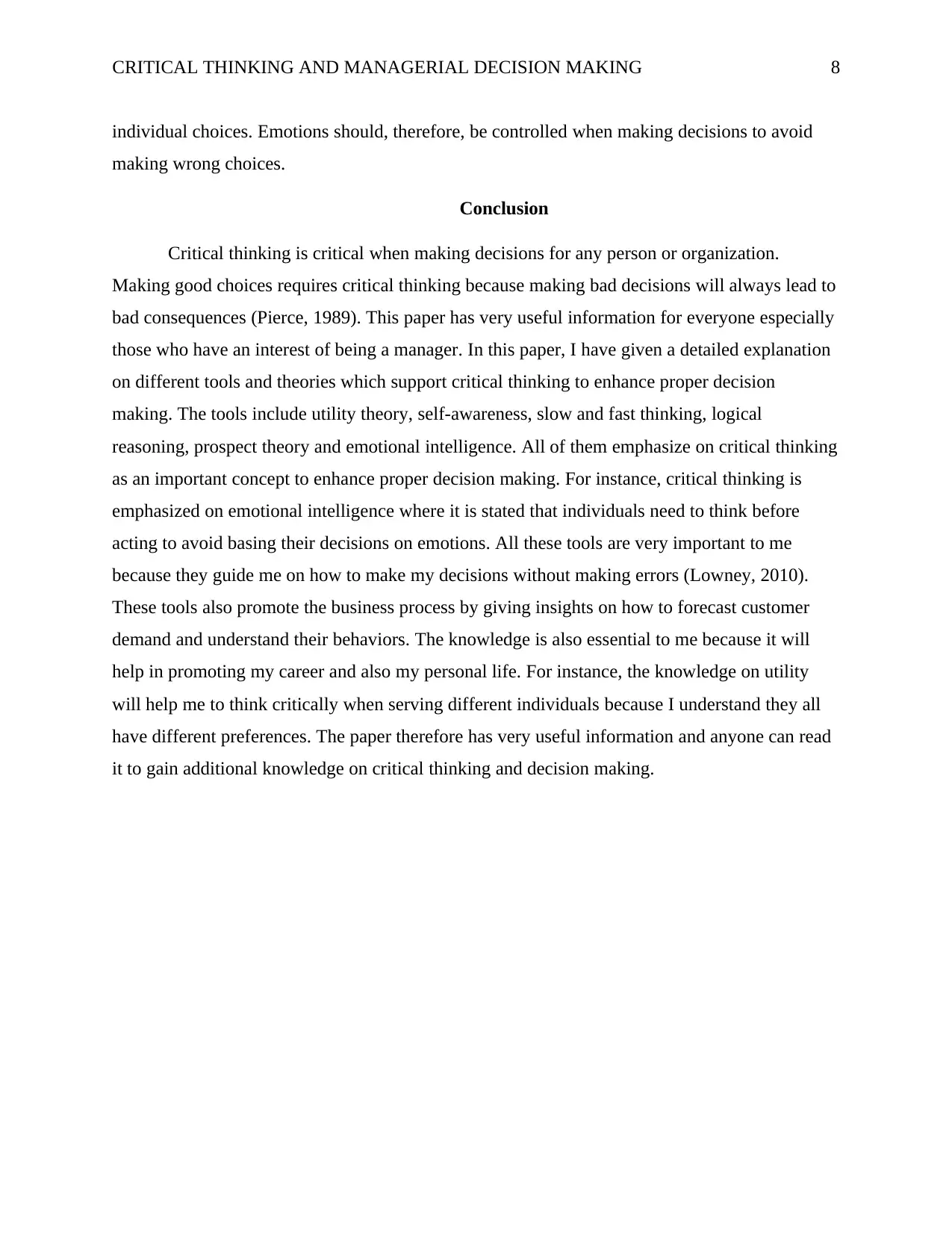
CRITICAL THINKING AND MANAGERIAL DECISION MAKING 8
individual choices. Emotions should, therefore, be controlled when making decisions to avoid
making wrong choices.
Conclusion
Critical thinking is critical when making decisions for any person or organization.
Making good choices requires critical thinking because making bad decisions will always lead to
bad consequences (Pierce, 1989). This paper has very useful information for everyone especially
those who have an interest of being a manager. In this paper, I have given a detailed explanation
on different tools and theories which support critical thinking to enhance proper decision
making. The tools include utility theory, self-awareness, slow and fast thinking, logical
reasoning, prospect theory and emotional intelligence. All of them emphasize on critical thinking
as an important concept to enhance proper decision making. For instance, critical thinking is
emphasized on emotional intelligence where it is stated that individuals need to think before
acting to avoid basing their decisions on emotions. All these tools are very important to me
because they guide me on how to make my decisions without making errors (Lowney, 2010).
These tools also promote the business process by giving insights on how to forecast customer
demand and understand their behaviors. The knowledge is also essential to me because it will
help in promoting my career and also my personal life. For instance, the knowledge on utility
will help me to think critically when serving different individuals because I understand they all
have different preferences. The paper therefore has very useful information and anyone can read
it to gain additional knowledge on critical thinking and decision making.
individual choices. Emotions should, therefore, be controlled when making decisions to avoid
making wrong choices.
Conclusion
Critical thinking is critical when making decisions for any person or organization.
Making good choices requires critical thinking because making bad decisions will always lead to
bad consequences (Pierce, 1989). This paper has very useful information for everyone especially
those who have an interest of being a manager. In this paper, I have given a detailed explanation
on different tools and theories which support critical thinking to enhance proper decision
making. The tools include utility theory, self-awareness, slow and fast thinking, logical
reasoning, prospect theory and emotional intelligence. All of them emphasize on critical thinking
as an important concept to enhance proper decision making. For instance, critical thinking is
emphasized on emotional intelligence where it is stated that individuals need to think before
acting to avoid basing their decisions on emotions. All these tools are very important to me
because they guide me on how to make my decisions without making errors (Lowney, 2010).
These tools also promote the business process by giving insights on how to forecast customer
demand and understand their behaviors. The knowledge is also essential to me because it will
help in promoting my career and also my personal life. For instance, the knowledge on utility
will help me to think critically when serving different individuals because I understand they all
have different preferences. The paper therefore has very useful information and anyone can read
it to gain additional knowledge on critical thinking and decision making.
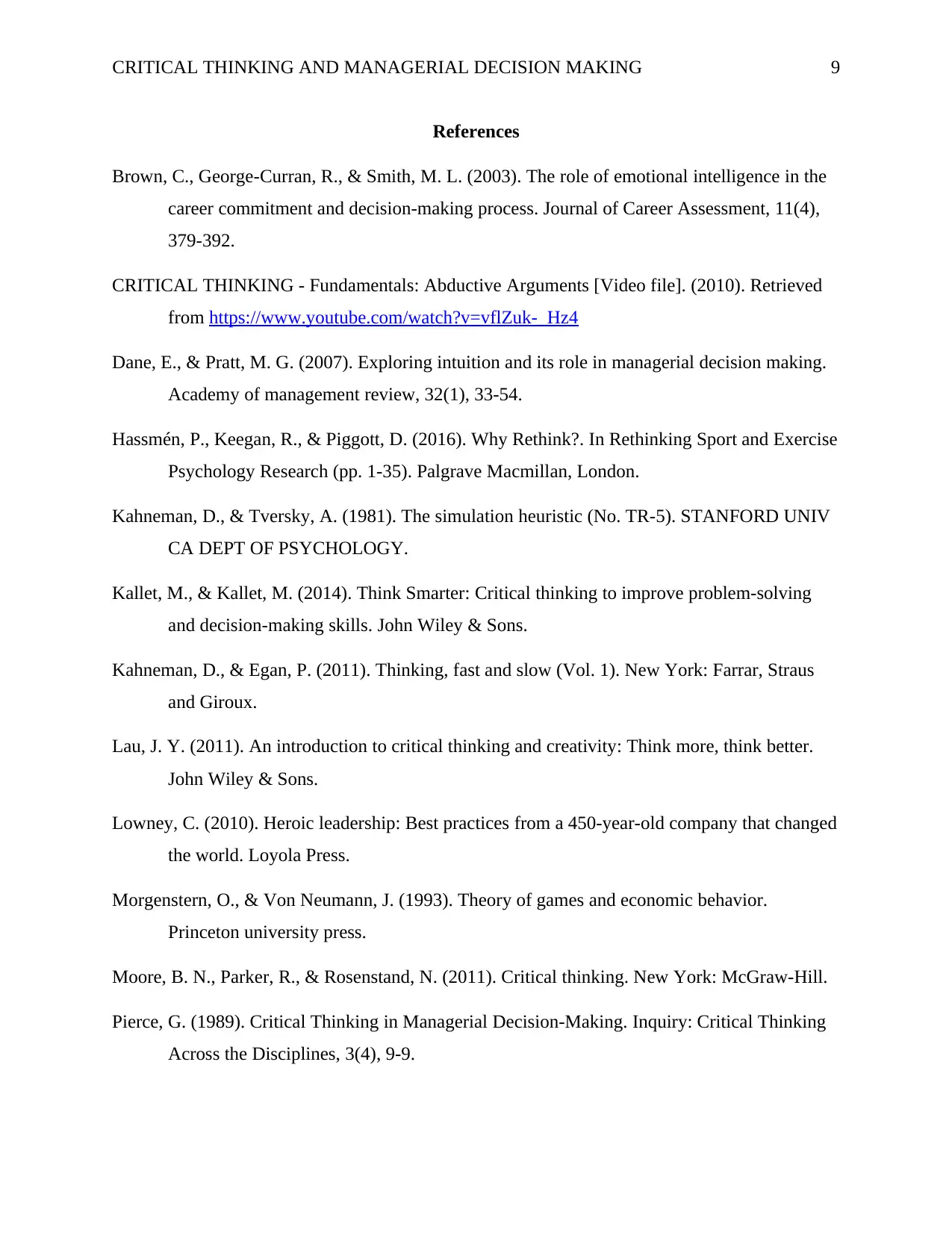
CRITICAL THINKING AND MANAGERIAL DECISION MAKING 9
References
Brown, C., George-Curran, R., & Smith, M. L. (2003). The role of emotional intelligence in the
career commitment and decision-making process. Journal of Career Assessment, 11(4),
379-392.
CRITICAL THINKING - Fundamentals: Abductive Arguments [Video file]. (2010). Retrieved
from https://www.youtube.com/watch?v=vflZuk-_Hz4
Dane, E., & Pratt, M. G. (2007). Exploring intuition and its role in managerial decision making.
Academy of management review, 32(1), 33-54.
Hassmén, P., Keegan, R., & Piggott, D. (2016). Why Rethink?. In Rethinking Sport and Exercise
Psychology Research (pp. 1-35). Palgrave Macmillan, London.
Kahneman, D., & Tversky, A. (1981). The simulation heuristic (No. TR-5). STANFORD UNIV
CA DEPT OF PSYCHOLOGY.
Kallet, M., & Kallet, M. (2014). Think Smarter: Critical thinking to improve problem-solving
and decision-making skills. John Wiley & Sons.
Kahneman, D., & Egan, P. (2011). Thinking, fast and slow (Vol. 1). New York: Farrar, Straus
and Giroux.
Lau, J. Y. (2011). An introduction to critical thinking and creativity: Think more, think better.
John Wiley & Sons.
Lowney, C. (2010). Heroic leadership: Best practices from a 450-year-old company that changed
the world. Loyola Press.
Morgenstern, O., & Von Neumann, J. (1993). Theory of games and economic behavior.
Princeton university press.
Moore, B. N., Parker, R., & Rosenstand, N. (2011). Critical thinking. New York: McGraw-Hill.
Pierce, G. (1989). Critical Thinking in Managerial Decision-Making. Inquiry: Critical Thinking
Across the Disciplines, 3(4), 9-9.
References
Brown, C., George-Curran, R., & Smith, M. L. (2003). The role of emotional intelligence in the
career commitment and decision-making process. Journal of Career Assessment, 11(4),
379-392.
CRITICAL THINKING - Fundamentals: Abductive Arguments [Video file]. (2010). Retrieved
from https://www.youtube.com/watch?v=vflZuk-_Hz4
Dane, E., & Pratt, M. G. (2007). Exploring intuition and its role in managerial decision making.
Academy of management review, 32(1), 33-54.
Hassmén, P., Keegan, R., & Piggott, D. (2016). Why Rethink?. In Rethinking Sport and Exercise
Psychology Research (pp. 1-35). Palgrave Macmillan, London.
Kahneman, D., & Tversky, A. (1981). The simulation heuristic (No. TR-5). STANFORD UNIV
CA DEPT OF PSYCHOLOGY.
Kallet, M., & Kallet, M. (2014). Think Smarter: Critical thinking to improve problem-solving
and decision-making skills. John Wiley & Sons.
Kahneman, D., & Egan, P. (2011). Thinking, fast and slow (Vol. 1). New York: Farrar, Straus
and Giroux.
Lau, J. Y. (2011). An introduction to critical thinking and creativity: Think more, think better.
John Wiley & Sons.
Lowney, C. (2010). Heroic leadership: Best practices from a 450-year-old company that changed
the world. Loyola Press.
Morgenstern, O., & Von Neumann, J. (1993). Theory of games and economic behavior.
Princeton university press.
Moore, B. N., Parker, R., & Rosenstand, N. (2011). Critical thinking. New York: McGraw-Hill.
Pierce, G. (1989). Critical Thinking in Managerial Decision-Making. Inquiry: Critical Thinking
Across the Disciplines, 3(4), 9-9.
⊘ This is a preview!⊘
Do you want full access?
Subscribe today to unlock all pages.

Trusted by 1+ million students worldwide
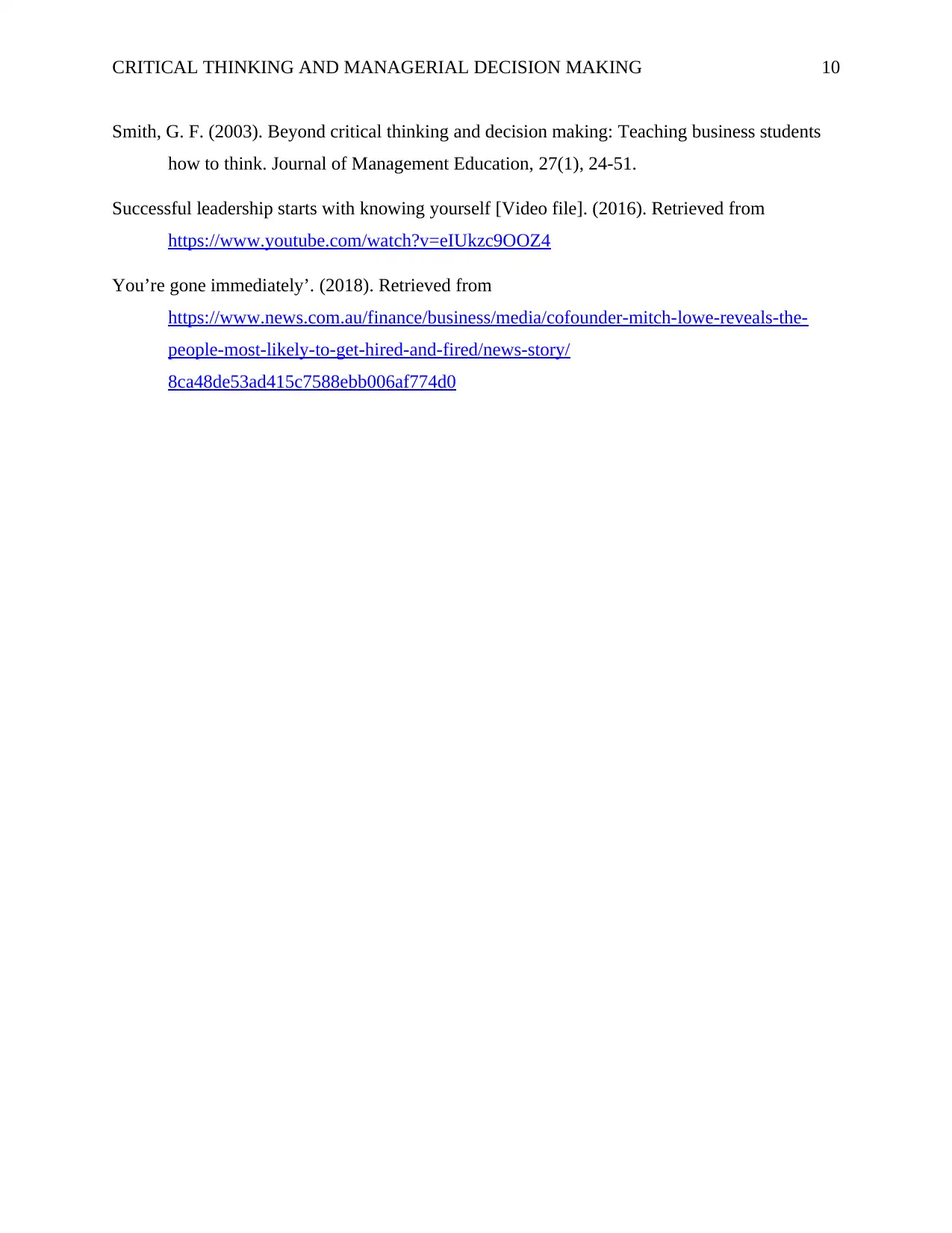
CRITICAL THINKING AND MANAGERIAL DECISION MAKING 10
Smith, G. F. (2003). Beyond critical thinking and decision making: Teaching business students
how to think. Journal of Management Education, 27(1), 24-51.
Successful leadership starts with knowing yourself [Video file]. (2016). Retrieved from
https://www.youtube.com/watch?v=eIUkzc9OOZ4
You’re gone immediately’. (2018). Retrieved from
https://www.news.com.au/finance/business/media/cofounder-mitch-lowe-reveals-the-
people-most-likely-to-get-hired-and-fired/news-story/
8ca48de53ad415c7588ebb006af774d0
Smith, G. F. (2003). Beyond critical thinking and decision making: Teaching business students
how to think. Journal of Management Education, 27(1), 24-51.
Successful leadership starts with knowing yourself [Video file]. (2016). Retrieved from
https://www.youtube.com/watch?v=eIUkzc9OOZ4
You’re gone immediately’. (2018). Retrieved from
https://www.news.com.au/finance/business/media/cofounder-mitch-lowe-reveals-the-
people-most-likely-to-get-hired-and-fired/news-story/
8ca48de53ad415c7588ebb006af774d0
1 out of 10
Related Documents
Your All-in-One AI-Powered Toolkit for Academic Success.
+13062052269
info@desklib.com
Available 24*7 on WhatsApp / Email
![[object Object]](/_next/static/media/star-bottom.7253800d.svg)
Unlock your academic potential
Copyright © 2020–2026 A2Z Services. All Rights Reserved. Developed and managed by ZUCOL.





